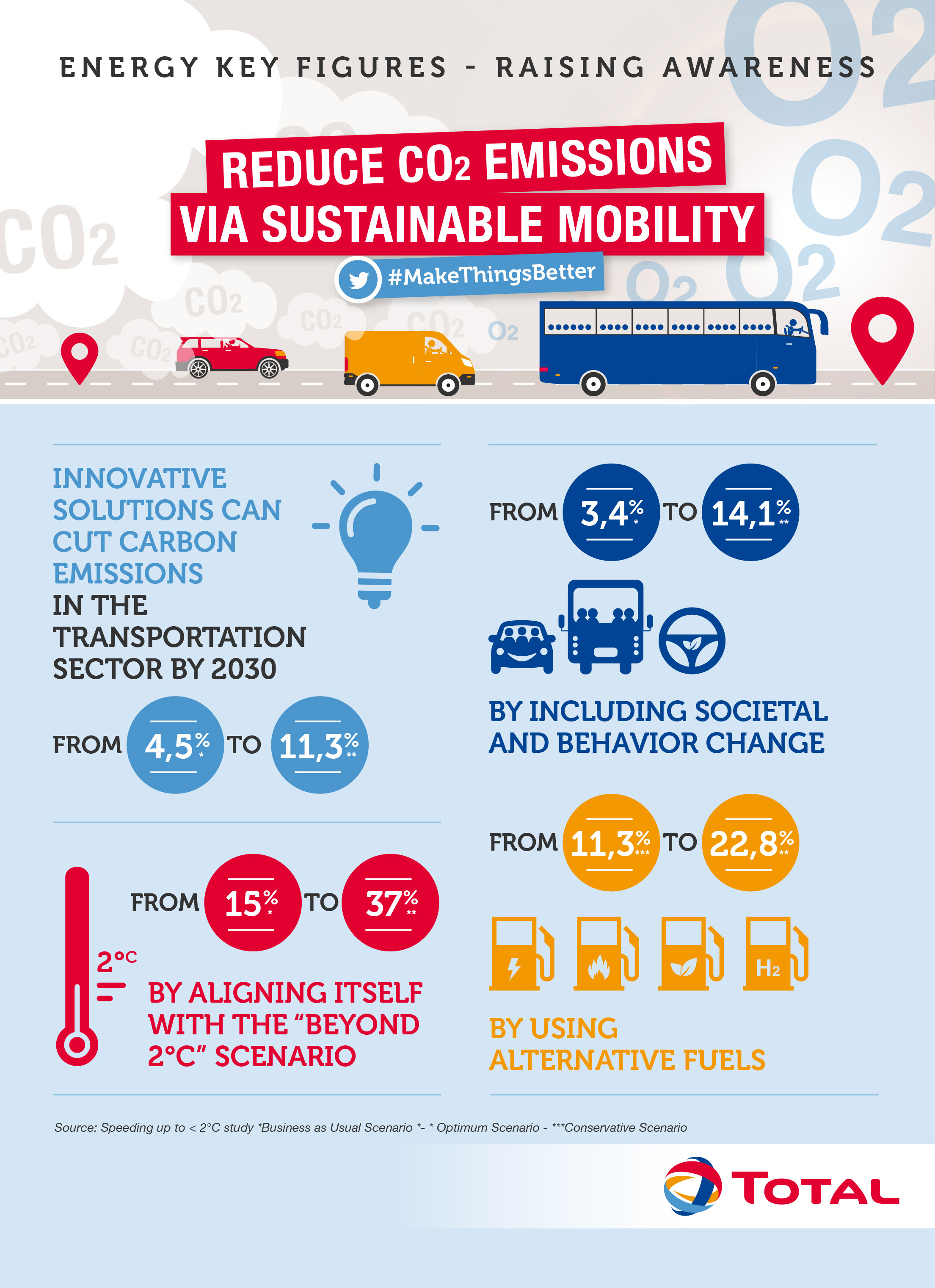First, sustainable mobility articulates perfectly with Total's ambition to be the responsible energy major by aligning itself with the International Energy Agency's 2 degrees Celsius scenario. We realize that a sizeable percentage of carbon emissions, or of particulates and other transportation sector pollutants2, are related to energy use. Total therefore constantly seeks solutions to address this issue while creating value for society as a whole through providing as many people as possible with safe, clean, affordable and accessible energy. We can tap the expertise of people who've been working in these areas for years.
Total works routinely on projects such as improving energy efficiency and the energy mix, developing low-carbon businesses, helping make materials and thus vehicles lighter, making them more fuel efficient, formulating and marketing new fuels and lubricants that can cut fuel use, promoting vehicle electrification and educating the public about road safety. All Total business segments are involved in sustainable mobility.
• For more on the subject:
11 billion miles a year without polluting?
The objective of the study was to promote solutions that could reduce greenhouse gases and are technologically mature and within reach in the next decade. Once again, the emphasis is on "doing," so we can deploy solutions rapidly and have a positive impact in the short or medium term.
The simple conclusion: it's doable! There are already technological, behavioral and regulatory solutions that can be deployed. We've identified seven of them. For example, cities and businesses can agree to slightly shift their business hours to prevent commuter congestion. Transportation operators can, with the help of energy companies like us, step up the use of new energies such as natural gas vehicle fuel, for which Total hopes to become a leader in Europe.
The study singles out three, behavior-based, short-term solutions:
- • Incentives in favor of behavioral and modal shifts in passenger transportation.
- • Eco-driving technologies and training programs.
- • Car-pooling applications for short distances and the sharing economy in freight transport.
And four energy-related, medium-term solutions:
- • Sustainable biofuels.
- • Battery electric vehicles.
- • Natural gas vehicles.
- • Hydrogen-based fuel cell electric vehicles.
The good news is that if such solutions were deployed on a large scale, they would add up to as much as 37 percent of the mitigation effort expected in the transportation sector to achieve 2 degrees Celsius, specifically a 30 percent reduction in carbon emissions. Total is active in each of those solutions. Examples include:
Lastly, many of the solutions that can be implemented in the very short term involve changing individual or collective behavior. So let's get going!
• For more on the subject:
Where the molecules of the future are designed
The theme for 2018 is "Bringing global, smart, sustainable and multimodal mobility to life." Everyone involved in sustainable mobility will be there, to brainstorm, learn and take coordinated action. Total has partnered the event since the fourth one. The number is up to 14 already, when you count the previous version, which was called the Michelin Challenge Bibendum.
We're very involved in Movin'On. Patrick Pouyanné, Total's CEO, will speak as part of a panel on May 30 on the topic of "The great pathways to the future of mobility." He will share Total's sustainable mobility vision and goals.
Plus, we will lead two working sessions:
- • May 30, afternoon: "New technologies and energy combinations for sustainable road freight transport."
- • May 31, afternoon: "Successful transition towards electric mobility."
They, too, will present challenges and possible actions and spur participants to think about and work on the solutions we can implement to bring about change faster.
• For more on the subject:
The changing face of transport
I'd say that it's up to us to create reasons for optimism. What we need is a comprehensive, realistic vision. The issues facing Western Europe are not the same as North America's, still less Asia's or Africa's. In one case the vehicle fleet will grow dramatically, while the other needs access to clean, reliable energy before anything else.
No one has all the keys to meeting the 2 degrees Celsius challenge. It will take the intervention of regulators and their incentive — or coercive — power, the capability of industrial operators, which have or will have the technology, and the ability of citizens/users to change their behavior without sacrificing convenience or service.
The "Speeding up to less than 2°C" study showed the same thing. To quote Alexis Gazzo, partner at EY Climate Change & Sustainability Services and facilitator of Open Lab Mobility's Beyond 2°C community: "This study shows that governments and the private sector can achieve significant results by working together to implement the right enabling environment, provide positive incentives to foster change, and promote the large-scale development of innovative solutions."
As you can see, everyone is interdependent, so consensus building and co-creation are the key. That's what Open Lab Mobility and Movin'On are all about.


